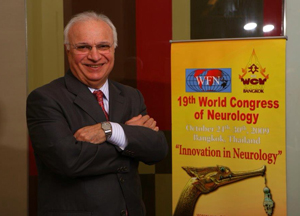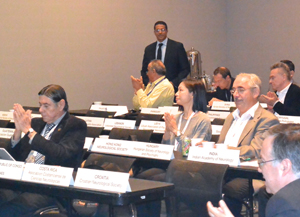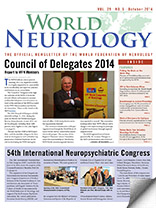Report to WFN Members
By Raad Shakir, President, WFN
 The WFN holds an annual general meeting. As a U.K. registered charity, it is legally required to be accountable to its membership and report its activities and finances on an annual basis.
The WFN holds an annual general meeting. As a U.K. registered charity, it is legally required to be accountable to its membership and report its activities and finances on an annual basis.
The Council of Delegates is the highest authority of the WFN. It holds the elected officers and trustees to account and has the full power over all matters related to the activities of the WFN as stated in the WFN Memorandum and Articles of Association. These can be found on the WFN website.
The 2014 Council of Delegates (COD) was held on Sept. 11, 2014, during the joint ACTRIMS/ECTRIMS meeting in Boston, Massachusetts. A total of 34 out of 116 delegates, including those with proxies, were eligible to vote. (See Figure 1 on page 15)
This was my first COD as WFN president, and I thanked the delegates for their trust in electing me as well as thanked my predecessor Vladimir Hachinski for his role in developing the WFN during his term of office. I will do my best to move the organization forward.
The continued collaboration with peer organizations through the World Brain Alliance will be further cemented to ensure that it will prosper. The creation of the Regional Directors Liaison Committee under the chairmanship of Tim Pedley, WFN North America regional director, was reported to council. This committee is independent from WFN officers and is charged with implementing the principle of global involvement through regional empowerment.

Figure 1. Delegates voting on business at the Council of Delegates.
The COD approved several items presented by the trustees. Changes to the WFN Memorandum and Articles of Association were presented. This is an important amendment, which has been recommended by WFN reviewers and endorsed by successive Constitution and Bylaws Committees. The WFN trustees, following legal advice from Hunters, WFN lawyers, approved this change. This specifically separates the post of secretary-treasurer general into two, one of secretary general and the other of treasurer. The reasoning and background was presented to Council. Prof. Alastair Compston (UK) previous chairman of the Constitution and Bylaws Committee further explained the background. The amendment was accepted by unanimous vote. This means that there shall be two posts for COD to elect in Santiago 2015; that of treasurer and another trustee to replace the vacated post of Wolfgang Grisold following his election as secretary-treasurer general.
The Nominating Committee presented the COD with four candidates for the post of trustee. The vacancy was created by the end of the second term of Prof. Gustavo Roman. Prof. Roman has served the WFN for many years and will continue to do so as the chairman of the Latin America Initiative. He served with three WFN presidents; his wisdom and considered advice were invaluable.
The four candidates were Jose Biller (U.S.), Riadh Gouider (Tunisia), Man Mohan Mehndiratta (India) and Serefnur Ozturk (Turkey). Following a second ballot, Prof. Gouider was duly elected as WFN trustee. (See Figure 2.) The officers and trustees welcome Riadh to the team. His experience in the WFN goes back many years and his current position as president of the Pan African Association of Neurosciences Societies would be most useful to the WFN. The WFN is most indebted to Prof. Eduard Auff (Austria), president of WCN 2013 Vienna for supervising the election process.

Figure 2. Prof. Riadh Gouider being elected WFN trustee.
Prof. William Carroll, WFN first vice president, who chairs the WFN Congress Committee and the Specialty Network, spoke at the meeting. He informed the council of the current status of the preparations for the forthcoming congresses in Santiago, Chile, Oct. 30-Nov. 4, 2015, and Kyoto, Japan, Nov. 14-19, 2017. The preparations for Chile are well on target and the submission of abstracts is open. As with all World Congresses, there are a substantial number of travelling fellowships to encourage young neurologists to attend. Prof. Carroll detailed the current status of the close relationship with specialty neurology organizations in partnered educational endeavors and members of the World Brain Alliance in matters of global advocacy; both of which are highly valued by the WFN. The existing disparity between the six WFN regions was emphasized. The trustees are keen to see the growth of stable and independent functioning regional organizations through the coordinated endeavors of the regional directors and initiative chairs.
Prof. Wolfgang Grisold, secretary-treasurer general, presented the WFN financial status. The audited accounts were already sent to all delegates. The WFN is in good financial standing. The WFN is a lean organization run efficiently by two full-time and three part-time staff. The cost of the central office in London and elsewhere is relatively small. The total assets of the WFN at the end of 2013 amounted to £ 3,155,812. The rise in assets in spite of increased spending is mainly due to the excellent profit made by the Vienna WCN. We have to give our gratitude to the Austrian Society of Neurology and the now amalgamated European Federation of Neurological Societies for their efforts and close collaboration. The excellent collaboration will continue with the European Academy of Neurology.
A decision of the WFN trustees was made to allocate 30 percent of the annual budget to grants. The grants for 2013 were already dispersed and those for 2014 were decided and have started to be awarded. The WFN is most grateful to grant reviewers and to members of the World Brain Alliance and Specialty Network for their support and agreement to be partners in financing grants.
Prof. Grisold detailed the success of the World Brain Day, which was held on July 22, 2014. All member societies that participated were duly thanked. The day will be expanded in 2015, and more activities are planned. The WFN publications and website report were detailed and activities on social media were brought to the attention of the council, these continue to grow and expand.
Prof. Grisold outlined the activities of the education committee chaired by Steven Lewis (U.S.) announcing the departmental visiting programs, which successfully started in Turkey, and have now been agreed to start in Austria. The start of the Rabat training program was mentioned, and Prof. Gallo Diop detailed this in his Africa initiative report. Negotiations are under way to establish further WFN accredited training centers.
Prof. Diop, WFN trustee, chair of the Africa Initiative, gave an account of the status of neurology across Africa. Although the situation is still dire in many countries, there is clear increase in neurological services and manpower. This is most welcome and plans to expand the role of the WFN on its own and in partnership with others including EAN, IBRO, IPMDS and AAN were detailed. The WFN is committed to the Africa initiative, which receives financial support through grants, and the reserved fund created following WCN Marrakesh.
Prof. Diop pointed out the start of training African neurologists in Africa with the commencement of training in September 2014, in the first WFN accredited training center in Rabat, Morocco. The WFN is most indebted to the Moroccan Neurological Society and the Moroccan Neurology Foundation for their continuous and indefatigable support for all WFN activities and in particular their commitment to training African neurologists in Africa.
Prof. Roman informed the council of the final stages of the formation of the Pan American Federation of Neurological Societies (PAFNS) to represent Neurology in Latin America. The WFN has designated grants for three developing regions: Asia, Africa and Latin America. This newly formed federation should unite the Latin American neurological world by the time the 22nd WCN is held in Chile.
Prof. Ryuji Kaji (Japan), chair of the Asia Initiative could not be in Boston. I pointed out the huge success of the Asian Oceanian Association of Neurologists. The association is now mature and active. First Vice President William Carroll and I had the pleasure of attending the Asian Oceanian Congress of Neurology in Macau in March 2014. The organization is moving ahead with its activities and is participating in the organization of the 23rd WCN Kyoto.
The COD official business is crucial and its decisions are legally binding to the WFN, but perhaps as importantly, is the interaction and relationships of delegates to renew friendships, start new ones, exchange ideas and news of the past year. There is no replacement for face-to-face meetings. The annual council of delegates meeting is that and much more. The next COD meeting will be held Oct. 31, 2015, in Santiago, Chile.
